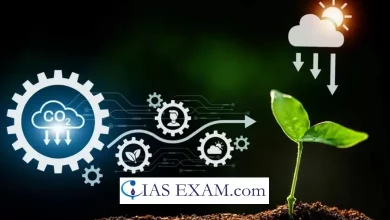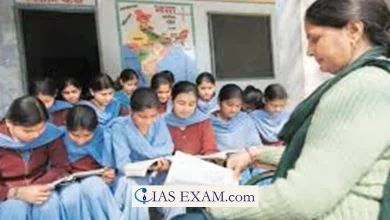Importance of Public Policy Education
[GS Paper 2 - Government Schemes and Policies]

Context – Government policies play a crucial role in determining the future of a country. They not only impact economic growth and public welfare but also improve the ease of living for citizens.
Unfortunately, there is a lack of interest in public policy education in India, with only a small percentage of policymakers having formal education in public policy and administration.
Public Policy Education
Public policy education refers to the study and teaching of the principles, theories, and methods involved in the development, implementation, and evaluation of policies that address societal issues. This field of education aims to equip students with the knowledge and skills necessary to analyze, create, and manage public policies effectively.
Interconnection between Government Policies, Economic Growth and Public Welfare
- Government Policies: Governments create and implement policies to guide economic activities, maintain social order, and promote the welfare of their citizens. These policies cover a wide range of areas, such as fiscal and monetary policy, trade policy, education, healthcare, social security, and infrastructure development. The effectiveness of these policies can have a direct impact on economic growth and public welfare.
- Economic Growth: Economic growth is the increase in a country’s output of goods and services over time, usually measured by the growth rate of gross domestic product (GDP). A growing economy typically leads to higher employment, increased income, and improved living standards for citizens. Government policies play a crucial role in stimulating or hindering economic growth by influencing factors such as investment, consumption, trade, and innovation.
- Public Welfare: Public welfare refers to the overall well-being of a society, encompassing aspects such as income distribution, access to essential services, health, education, and environmental quality. Government policies can significantly impact public welfare by determining the allocation of resources, setting priorities, and providing social safety nets.
Paucity of Programs and lack of Exposure
- As per the All-India Council for Technical Education, there are 3,182 institutions with an approved intake of 4.22 lakh in business management programs, but only about 130 universities that offer public administration programs and only 29 institutes that offer public policy programs.
- The batch size of public policy courses is 20-60, and there are few jobs available for people pursuing such courses, which disincentivizes educational institutions and students from choosing public management courses.
- Most civil servants undergo departmental induction training programs that focus on the role they play in their department and not much on how to make good public policies.
- Consequently, very few civil servants have exposure to public management before joining service, which is critical for developing effective policies.
Suggestions to boost Public Policy in India
- Public Management can be made Compulsory in UPSC – Public management should be a compulsory subject for the UPSC civil service examination, either as a substitute for one optional subject or an additional paper. This will incentivize universities and private institutions to offer public policy education, research, and case studies at the graduate or postgraduate level, leading to a major boost in public policy education.
- Larger Component of Public Policy in Induction Training: Existing training institutions of the government should have a larger component of public policy as part of their induction training. Moreover, a case study bank for training should also be established.
- Specialized Positions of Public Policy Analysts: The government can create certain specialized positions of public policy analysts to be picked up from the market directly, thereby creating new job avenues for the graduates of public policy programs.
Conclusion
The lack of formal education in public management has led to governance lagging behind private sector management in terms of efficiency and effectiveness. Public policy education is essential for developing effective policies that spur economic growth, public welfare, and improve ease of living for citizens.





.png)



